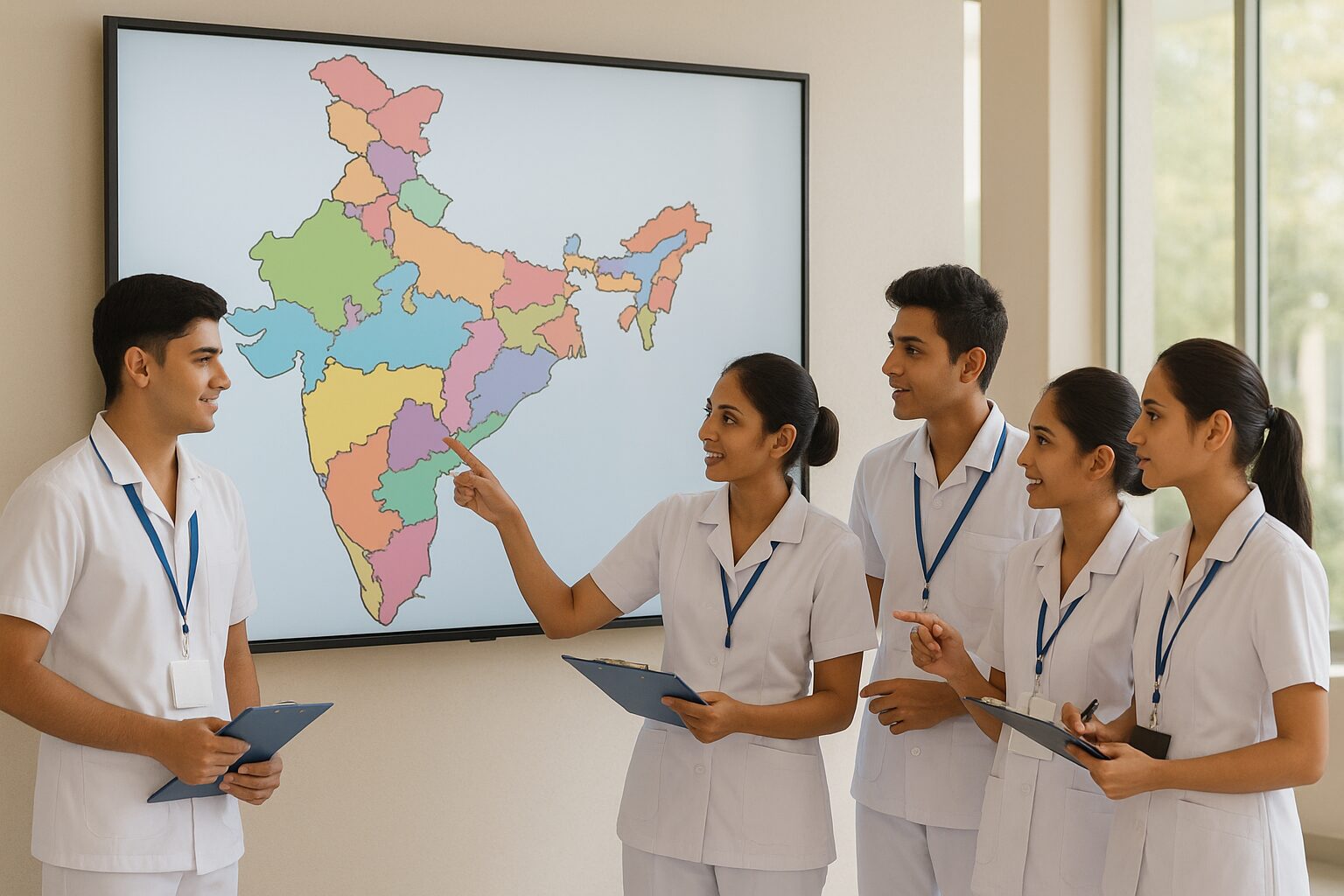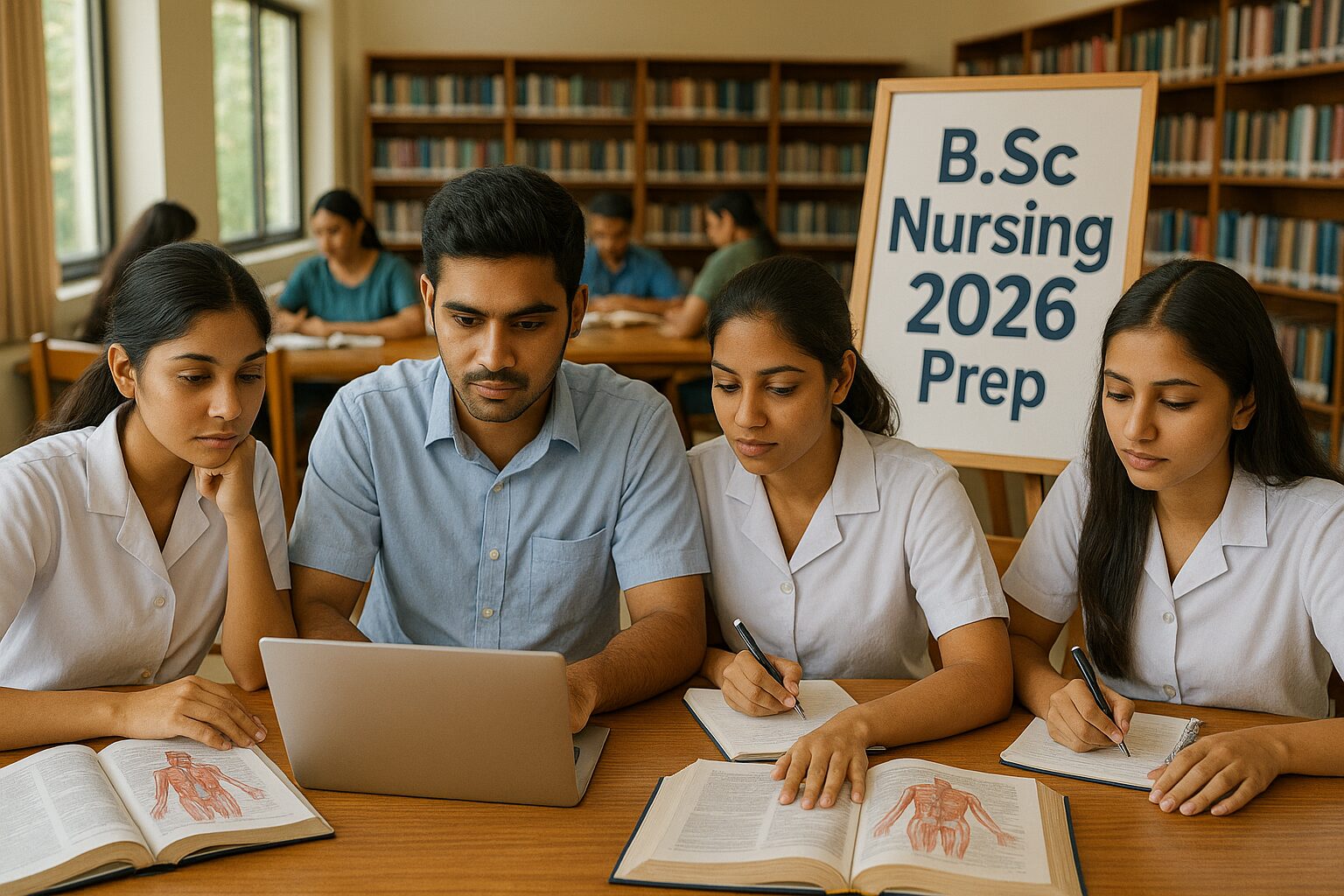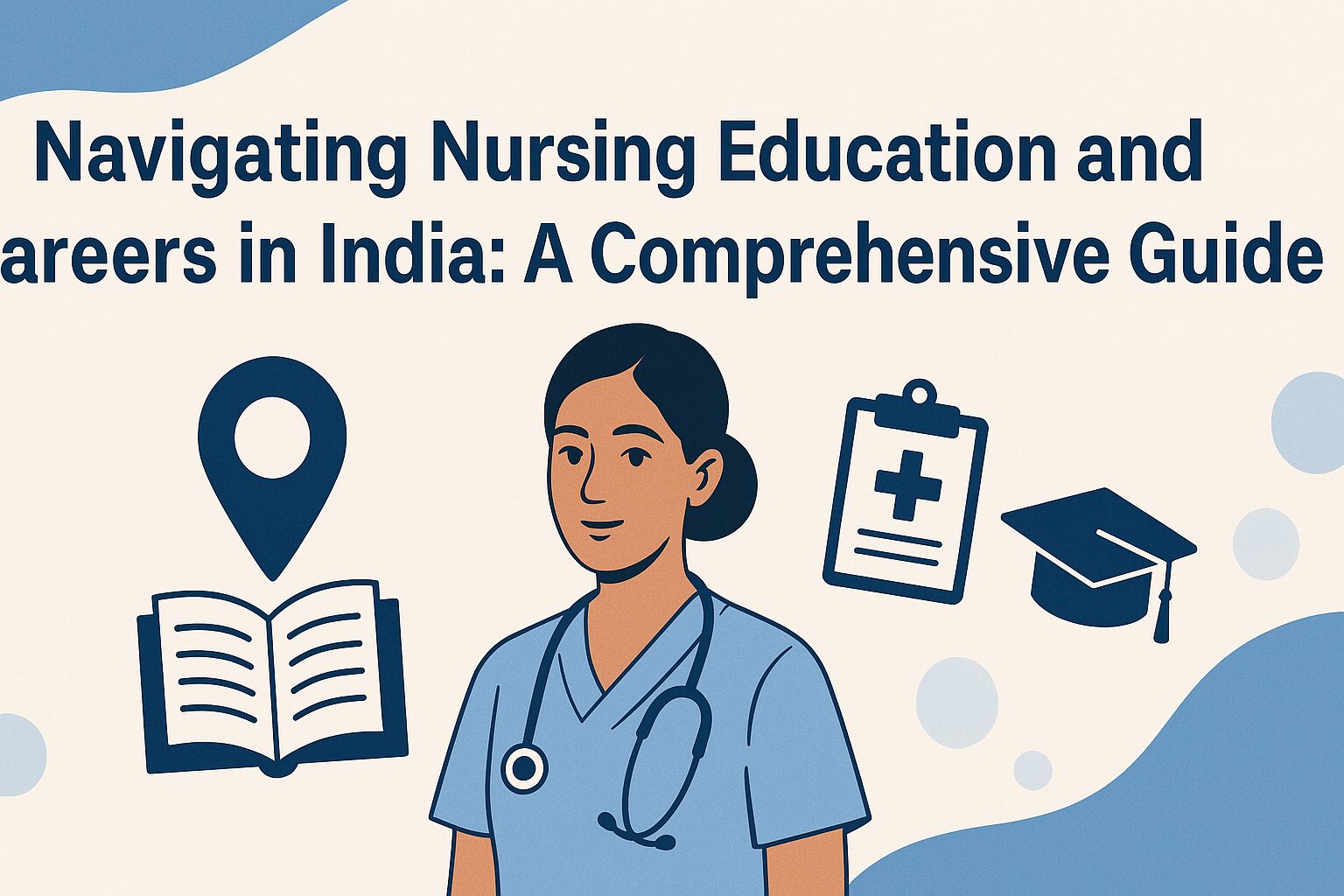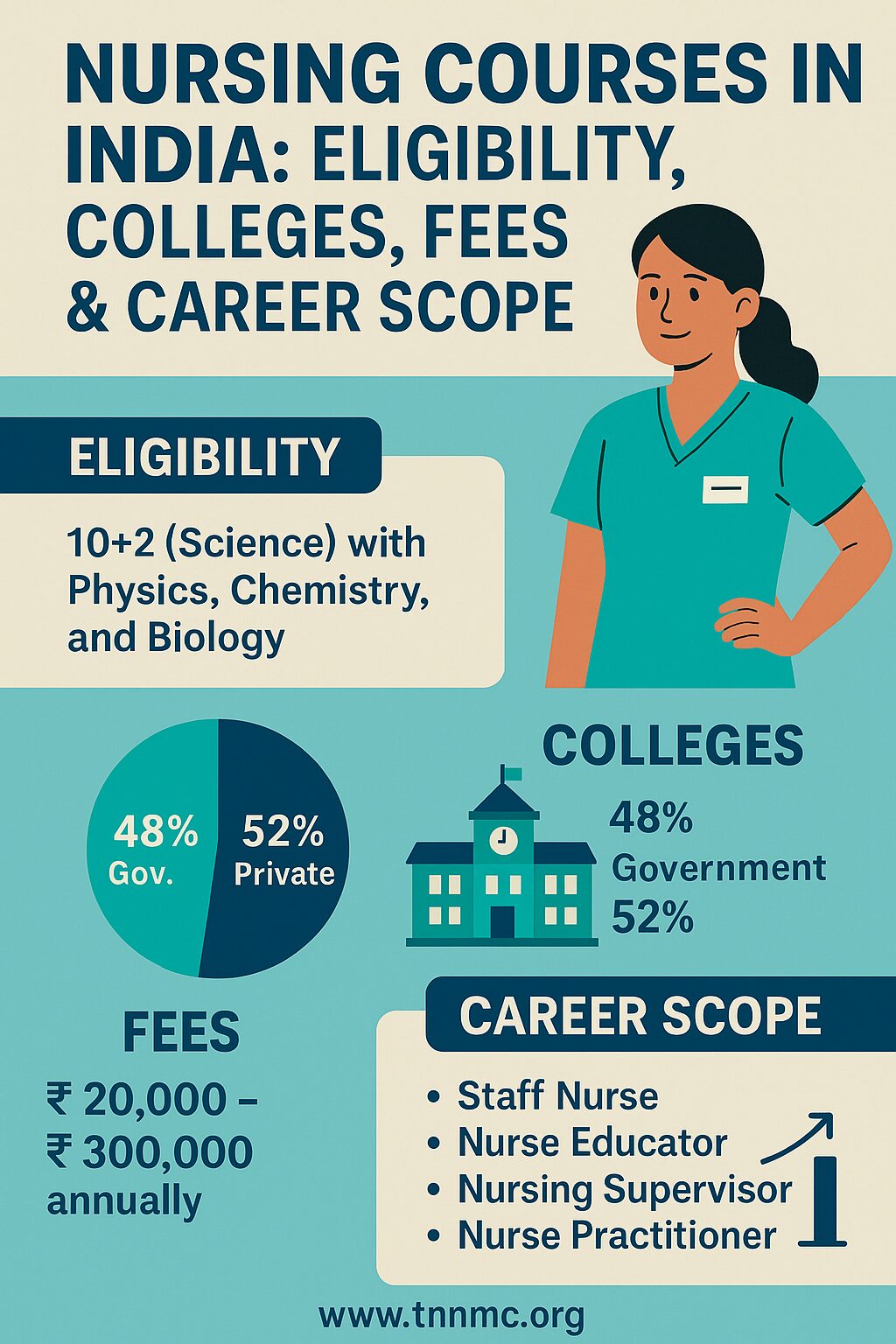The healthcare landscape in India is experiencing rapid growth, leading to a consistent and increasing demand for skilled nursing professionals. This evolution is underscored by significant governmental initiatives aimed at bolstering the nursing workforce. The World Health Organization (WHO) and the International Council of Nurses (ICN) have highlighted the critical need for a robust and well-trained nursing workforce to meet India’s expanding healthcare requirements. In a strategic response, India has committed to establishing 157 new nursing colleges by mid-2025, an endeavor projected to augment the nation’s nursing education capacity by an additional 15,700 seats annually. This substantial expansion reflects a proactive governmental approach to address both internal healthcare demands and capitalize on the global recognition of Indian nurses. The sheer scale of this initiative suggests increased accessibility to nursing education, which is a positive development for aspiring students. However, such rapid growth also presents potential challenges in maintaining a consistent standard of quality across a burgeoning number of institutions, particularly concerning the availability of qualified faculty and adequate clinical training facilities.
Choosing a Bachelor of Science (B.Sc.) in Nursing offers a compelling career path in the healthcare sector. This four-year undergraduate program is meticulously designed to equip individuals with the fundamental skills required for comprehensive patient care, proficient medical procedures, and effective healthcare management. Graduates from this program can pursue diverse roles, including Staff Nurse, Intensive Care Unit (ICU)/Emergency Room (ER) Nurse, Nurse Practitioner, Public Health Nurse, Clinical Nurse Specialist, Nurse Educator, and Nurse Administrator. The demand for skilled nurses continues to surge, propelled by the continuous expansion of healthcare infrastructure within India and the increasing global opportunities available to Indian nursing professionals. This rising demand, coupled with a growing emphasis on specialized nursing fields such as critical care, pediatrics, geriatrics, and mental health, indicates a profound shift in the profession. Concurrently, the pervasive integration of technology, including AI-powered diagnostic tools, electronic health records (EHRs), telemedicine, and advanced simulation technology for training, is fundamentally reshaping nursing practice. This convergence of specialization and technological advancement implies that the future of nursing will require professionals to possess not only strong clinical competencies but also advanced digital literacy. Consequently, B.Sc. Nursing curricula will increasingly need to incorporate these specialized clinical skills and digital proficiencies to ensure graduates remain competitive and relevant in an evolving healthcare landscape. Career progression will significantly favor those who continuously update their skills and adapt to these technological advancements.
Navigating the 2025 admission cycle for B.Sc. Nursing necessitates a thorough understanding of its multifaceted pathways. Prospective students can gain admission through national-level examinations like NEET UG, institution-specific tests conducted by premier institutes such as AIIMS, PGIMER, and KGMU, or state-level common entrance tests like MH CET in Maharashtra, Haryana CET, KCET in Karnataka, and UPCNET in Uttar Pradesh. A meticulous approach to understanding the specific eligibility criteria, application deadlines, and intricate counselling procedures for each desired institution is paramount for a successful admission journey.
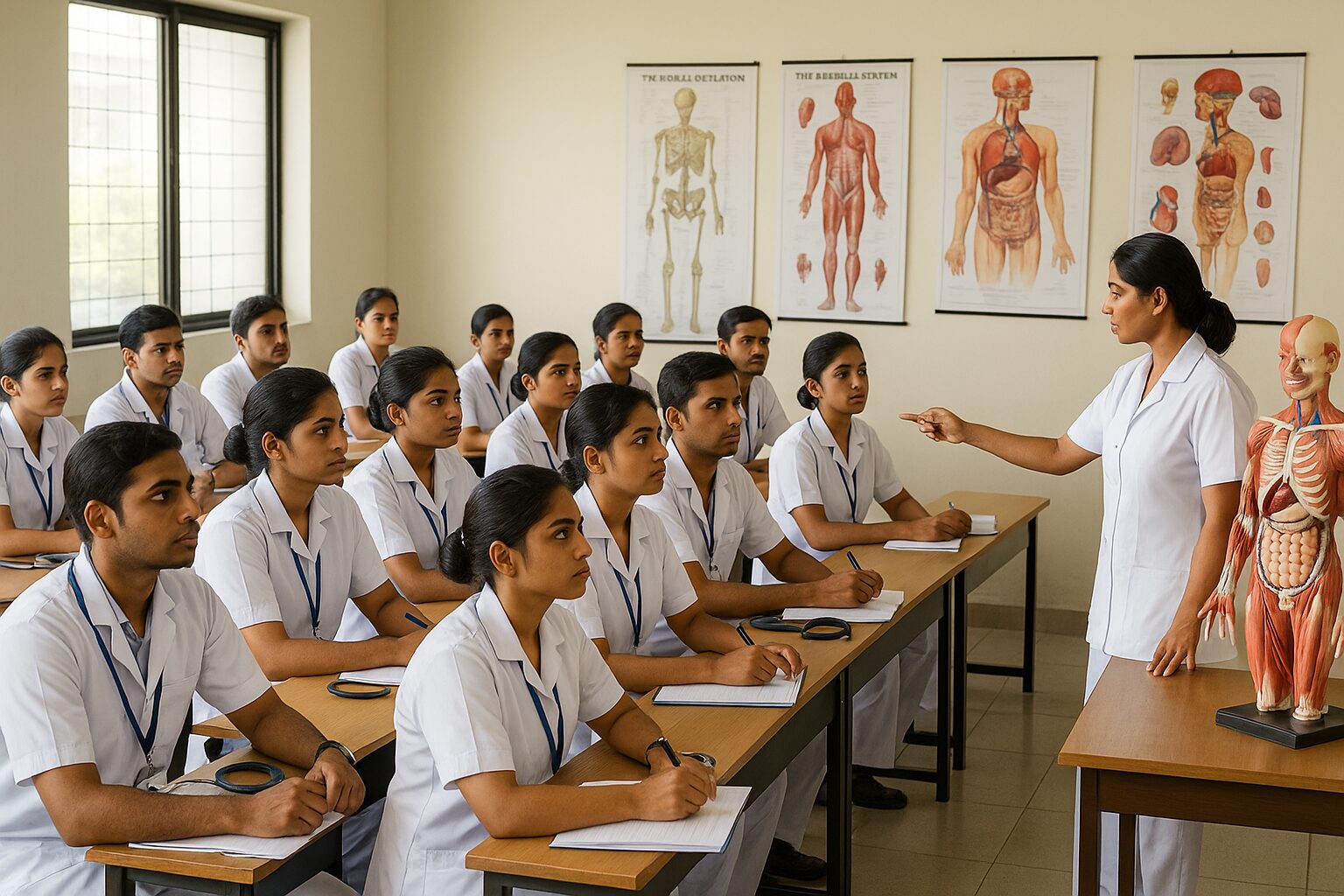
I. National-Level Entrance Examinations and Centralized Counselling
A. NEET UG 2025: The Primary Pathway
The National Eligibility-cum-Entrance Test (NEET-UG) 2025 has been officially mandated as the common and uniform entrance examination for admission to undergraduate medical programs across India, encompassing MBBS, BDS, and AYUSH courses (BAMS, BUMS, BSMS, BHMS). For B.Sc. Nursing, NEET (UG) 2025 is specifically required for admission to Military Nursing Service (MNS) courses conducted at Armed Forces Medical Service Hospitals. The NEET score serves as a crucial criterion for shortlisting candidates for these four-year nursing programs.
Beyond the MNS, a growing number of esteemed institutions have officially confirmed their acceptance of NEET 2025 scores for B.Sc. Nursing admissions. These include the Jawaharlal Institute of Postgraduate Medical Education & Research (JIPMER) Puducherry, Banaras Hindu University (BHU), Armed Forces Medical College (AFMC) Pune, Lady Hardinge Medical College (LHMC) Delhi, and Vardhman Mahavir Medical College (VMMC) & Safdarjung Hospital. This widespread adoption signals a significant move towards a more standardized national admission process for a substantial segment of nursing programs.
Eligibility Criteria:
- Age: Candidates must have attained a minimum age of 17 years on or before December 31, 2025. A notable policy change is the removal of any upper age limit for appearing in the NEET UG examination, thereby allowing individuals of all ages to apply.
- Academic Qualifications: Applicants must have passed or be appearing for their 10+2 (or equivalent) examination. The curriculum must include Physics, Chemistry, Biology/Biotechnology, and English as compulsory core subjects.
- Minimum Marks: For the General category, a minimum aggregate of 50% marks in Physics, Chemistry, and Biology/Biotechnology is mandatory. For candidates belonging to the Other Backward Classes (OBC), Scheduled Castes (SC), and Scheduled Tribes (ST) categories, the minimum aggregate is 40%. Persons with Benchmark Disabilities (PwD) require a minimum of 45% marks.
Exam Pattern and Key Syllabus Areas: NEET UG 2025 was conducted in an offline, pen-and-paper mode, utilizing an OMR sheet for responses. The examination duration was 3 hours and 20 minutes. The question paper comprised 200 Multiple Choice Questions (MCQs), from which candidates were required to attempt 180. Questions were systematically distributed across three main subjects: Physics, Chemistry, and Biology (which includes both Botany and Zoology). The marking scheme awarded +4 marks for each correct answer, deducted -1 mark for each incorrect answer, and assigned 0 marks for unattempted questions. The syllabus for NEET UG 2025 was based on the curricula of classes XI and XII, with a strong emphasis on core concepts within Physics, Chemistry, and Biology.
Crucial Dates:
- Application Period: The online registration for NEET UG 2025 commenced on February 7, 2025, and concluded on March 7, 2025.
- Correction Window: A facility for correcting submitted application forms was available from March 9-11, 2025.
- Exam Date: The NEET UG 2025 examination was held on Sunday, May 4, 2025.
- Provisional Answer Key Release: Expected in the second week of May 2025.
- Result Declaration: The NEET UG 2025 results are tentatively scheduled for release by June 14, 2025.
- Counselling Commencement: The counselling process for NEET UG 2025 is expected to commence in July or August 2025, following the result declaration.
Required Documents for Application and Counselling: For the initial application form, candidates were required to prepare: a recent passport-size photograph and a postcard-size photograph (both taken after January 1, 2025, with a white background and 80% face coverage), a scanned signature (blue or black ink on white paper), clear left and right-hand finger and thumb impressions, Class 10 passing certificate, category certificate (if applicable), PwBD certificate (if applicable), citizenship certificate, and address proof. The highly specific and stringent requirements for digital document uploads, coupled with explicit warnings about rejection for non-compliance, indicate a sophisticated, likely automated, initial screening process. This implies that prospective candidates must pay meticulous attention to these technical specifications during the online application phase to avoid immediate disqualification due to minor formatting errors.
For the counselling process, a more extensive list of original documents is required: NEET Admit Card, NEET Result/Rank Letter, Class 10 & 12 Mark Sheets and Pass Certificates, a valid Identity Proof (Aadhaar/PAN/Driving License/Passport), Category Certificate (if applicable), Domicile Certificate (particularly for state quota seats), a Medical Fitness Certificate, and eight passport-size photographs. The mandatory submission of a Medical Fitness Certificate during NEET UG counselling signifies a comprehensive assessment of candidates that extends beyond academic performance to include physical and mental aptitude. This indicates that medical fitness is a non-negotiable prerequisite for entry into the demanding nursing curriculum, and prospective students should proactively obtain this certificate from a licensed medical professional well in advance of the counselling dates.
Table: NEET UG 2025 Important Dates & Eligibility Criteria
B. Institution-Specific Entrance Examinations
Despite the increasing prominence of NEET UG, several premier institutions continue to conduct their own specialized entrance examinations for B.Sc. Nursing admissions. This creates a diverse and sometimes fragmented admission ecosystem that requires careful navigation by aspiring students.
AIIMS B.Sc. Nursing Entrance Exam (Hons. & Post-Basic): The All India Institute of Medical Sciences (AIIMS) conducts its own highly competitive entrance examination for both B.Sc. (Hons.) Nursing and B.Sc. (Post-Basic) Nursing programs, notably not accepting NEET UG scores for these specific courses. This independent approach emphasizes AIIMS’s unique selection criteria.
- Eligibility: Candidates must be Indian citizens, have passed 10+2 or an equivalent exam with Physics, Chemistry, Biology, and English as core subjects, achieving a minimum aggregate of 55% marks (50% for reserved categories). The minimum age requirement is 17 years or above as of December 31, 2025. For the Post-Basic program, candidates additionally require a General Nursing and Midwifery (GNM) certificate and valid R.N.R.M. (Registered Nurse and Registered Midwife) registration with the State Nurses Registration Council.
- Exam Structure: The examination is a Computer-based Test (CBT) consisting of Multiple Choice Questions (MCQs). The B.Sc. (Hons.) exam is 120 minutes long and features 100 questions, distributed as Physics (30 marks), Chemistry (30 marks), Biology (30 marks), and General Knowledge (10 marks). The marking scheme awards +1 mark for a correct answer and deducts -1/3 mark for an incorrect answer. The B.Sc. (Post-Basic) exam is 90 minutes long, also with 100 questions, and includes a significant 30-mark personal interview component.
- Dates: The basic registration window for AIIMS B.Sc. Nursing 2025 closed on May 7, 2025. The final registration and code generation period extended until May 15, 2025. The B.Sc. (Hons.) exam was scheduled for June 1, 2025, with results announced on June 6, 2025. The B.Sc. (Post-Basic) exam took place on June 21, 2025, with its results released on June 27, 2025. The counselling process for these programs is expected to commence in July or August 2025.
PGIMER Nursing Entrance Exam: The Postgraduate Institute of Medical Education & Research (PGIMER) in Chandigarh conducts its distinct entrance examination for admission to its B.Sc. Nursing (4 years), B.Sc. Nursing (Post-Basic), and M.Sc. Nursing programs. This exemplifies another top-tier institution maintaining an independent entrance test, emphasizing its unique selection criteria.
- Eligibility: For the B.Sc. Nursing (4 years) program, only female candidates are eligible. Applicants must be between 17 and 25 years of age as of September 1, 2025, and must have passed 10+2 with Physics, Chemistry, Biology, and English, achieving at least 50% aggregate marks. For the Post-Basic program, candidates must be below 45 years of age (as of September 1, 2025), have completed 10+2 or equivalent, and secured a minimum of 50% in General Nursing and Midwifery (GNM) along with R.N.R.M. registration with a State Nursing Council.
- Exam Structure: The examination is conducted online as a Computer-Based Test (CBT), lasting 1.5 hours and comprising 100 Multiple Choice Questions (MCQs). The marking scheme awards +1 mark for each correct answer and deducts -0.25 marks for each incorrect answer. The syllabus covers Physics, Chemistry, Biology, English, and General Knowledge.
- Dates: The online application period for PGIMER B.Sc. Nursing 2025 commenced in the 4th week of May 2025, with the last date to apply set for the 4th week of June 2025. Admit cards are expected in the 4th week of July 2025, and the examination itself is scheduled for the 4th week of July 2025. Results are anticipated in the 2nd week of August 2025, followed by the commencement of counselling in the 3rd week of August 2025.
KGMU CNET 2025: King George’s Medical University (KGMU) Lucknow has transitioned its B.Sc. Nursing admissions to the Common Nursing Entrance Test (CNET) 2025, conducted by Atal Bihari Vajpayee Medical University (ABVMU) Lucknow, effectively replacing its previous individual entrance exam. This indicates a move towards a unified state-level entrance examination for nursing programs within Uttar Pradesh.
- Eligibility: Applicants must be Indian citizens, having passed 10+2 or equivalent with Physics, Chemistry, and Biology as mandatory subjects, securing a minimum of 45% marks for unreserved categories and 40% for reserved categories. Candidates must be between 17 and 35 years of age as of December 31, 2025.
- Exam Structure: The CNET 2025 exam is conducted offline, with a duration of 2 hours and 20 minutes. It consists of 120 Multiple Choice Questions (MCQs), with each correct answer fetching 1 mark and no negative marking for incorrect responses.
- Dates: The registration period for KGMU B.Sc. Nursing (via CNET) was from March 24 to May 3, 2025. The examination was held on May 21, 2025. Counselling dates commenced on June 2, 2025.
The continued existence of varied admission pathways, where some national-level institutions (like AIIMS and PGIMER) conduct their own specialized entrance exams while others (like JIPMER, BHU, AFMC, LHMC, VMMC) increasingly rely on NEET UG, and state universities (like KGMU via CNET) use state-specific tests, creates a complex and fragmented admission ecosystem for B.Sc. Nursing. This implies that aspiring students cannot adopt a “one-size-fits-all” approach to exam preparation. Instead, they must meticulously research the specific requirements of each target institution and manage multiple application timelines and distinct exam preparations, rather than relying solely on a single national examination. This complexity means that while a strong NEET score might open many doors, it is not a universal key for admission to all premier nursing programs, and a tailored approach is essential for maximizing admission chances.
II. Detailed Institutional Profiles: B.Sc. Nursing Admissions 2025
A. All India Institute of Medical Sciences (AIIMS)
Admission Process: AIIMS conducts its own rigorous entrance examination for B.Sc. (Hons.) Nursing and B.Sc. (Post-Basic) Nursing, expressly stating that it does not accept NEET UG scores for these programs. The admission journey involves several stages: an initial Basic Registration, followed by a detailed Final Registration (which includes application fee payment and exam city selection), subsequent Admit Card download, participation in the Written Test (Stage I), declaration of results, and finally, centralized counselling.
Seat Matrix: AIIMS Delhi specifically offers 96 seats for its B.Sc. (Hons.) Nursing program. More broadly, other AIIMS institutions also offer B.Sc. (Hons.) Nursing programs, with one source indicating 60 seats for B.Sc. (Hons.) Nursing.
Fee Structure: AIIMS Delhi B.Sc. Nursing is notable for its remarkably low total fee of Rs. 3,165 for the entire four-year duration. This comprehensive fee structure includes a minimal registration fee (Rs. 25), tuition fee (Rs. 600), pot money (Rs. 960), hostel fees (Rs. 480), a refundable hostel security deposit (Rs. 1000), and caution money (Rs. 100). In addition to these, a monthly mess charge of Rs. 700 is applicable.
Hostel Facilities: AIIMS Delhi boasts an extensive hostel infrastructure with 21 buildings, providing accommodation for approximately 2,717 students. Separate hostel facilities are available for both male and female students. The hostels offer a range of amenities including mess services, canteens, juice shops, Amul outlets, laundry services, access to the central library, sports facilities, and on-campus medical facilities. Hostel accommodation is specifically available for undergraduate students, including female B.Sc. Nursing students.
Bond Policy: While the provided information does not explicitly detail a mandatory service bond for B.Sc. Nursing students at AIIMS, one source mentions a general institutional policy where a student who leaves a course mid-way might be required to pay a fine of Rs. 5,000 to retrieve their original documents, provided they offer a valid reason. This policy, though mentioned in the context of an MBBS student, suggests a general institutional approach to early departures. The exceptionally low fee structure at AIIMS, combined with comprehensive on-campus facilities and a seemingly minimal financial penalty for early course withdrawal, points to a profound governmental subsidy aimed at making high-quality medical education highly accessible. This indicates that AIIMS prioritizes attracting and nurturing top talent and fostering a commitment to public service over recouping educational costs, making it an extraordinarily attractive and competitive option for academically strong students regardless of their socioeconomic background.
B. Jawaharlal Institute of Postgraduate Medical Education & Research (JIPMER) Puducherry
Admission Process: JIPMER Puducherry offers a four-year B.Sc. Nursing program, with admissions primarily based on NEET UG 2025 scores. The application process is conducted online and involves several steps: online registration, filling out the application form with personal and academic details, uploading scanned documents (photograph, signature, NEET UG 2025 scorecard, and relevant category certificates), paying the application fee online, and finally, submitting the form and taking a printout for future reference. Counselling and admission dates are to be announced following the NEET UG 2025 exam.
Seat Matrix: JIPMER Puducherry has a total intake of 94 seats for its B.Sc. Nursing program, with 85 seats reserved for female candidates and 9 for male candidates. This specific gender distribution indicates a strategic allocation aimed at promoting female participation in nursing, while also acknowledging the role of male nurses.
Fee Structure: The total fees for the entire B.Sc. Nursing program at JIPMER Puducherry are notably low, amounting to INR 11,410. This includes a one-time admission fee of INR 2,500, an annual academic fee of INR 1,200, a JIPMER Students Association Fee of INR 1,000 annually, a Learning Resource Fee of INR 2,000 annually, and a refundable caution deposit of INR 3,000. The application fee is INR 1,500 for General/OBC categories and INR 1,200 for SC/ST categories, with PwD candidates exempted.
Hostel Facilities: JIPMER provides hostel accommodation, subject to availability, with separate facilities for boys and girls. These hostels are primarily intended for outstation candidates. The hostel fee structure includes establishment charges (INR 6,000 per annum, non-refundable), a refundable hostel caution deposit (INR 5,000), and a refundable mess deposit (INR 3,000) payable at the time of admission. Room rent for shared accommodation is INR 500 per month (INR 6,000 annually). The provision of hostel facilities at JIPMER, coupled with its highly subsidized academic fees, demonstrates a commitment to providing an affordable and supportive learning environment. This comprehensive support system aims to reduce financial barriers, allowing students to focus on their demanding academic and clinical training without excessive economic strain.
C. Christian Medical College (CMC) Vellore
Admission Process: The admission process for CMC Vellore B.Sc. Nursing 2025 is a multi-stage procedure. Candidates must first complete an online application form, which requires personal details, a passport-size photograph, and the applicant’s signature, with the application fee payable online. Following this, candidates download their admit cards for the entrance examination. The selection process involves a preliminary Computer Based Entrance Test (Step-1), where candidates are short-listed based on their performance. Shortlisted candidates then proceed to Step-2, which includes special tests to assess character and aptitude, along with personal interviews. Admissions are based on inter-se merit, considering both academic performance and suitability for a professional career. Only unmarried female candidates are eligible for the B.Sc. Nursing degree.
Seat Matrix: CMC Vellore admits 100 students to its B.Sc. Nursing UG program. Of these, 15 seats are designated as “All India Open” (including 3 seats reserved for SC/ST candidates), while 85 seats are allocated under the “Minority Network & CMC Vellore Staff quota”. This significant proportion of seats reserved for the Minority Network and CMC Vellore Staff quota highlights the institution’s mission-driven approach, prioritizing the training of individuals committed to serving in areas of need, particularly within Christian mission hospitals. This allocation strategy reflects a broader institutional philosophy that balances academic merit with a commitment to community service and network development.
Fee Structure: The total fees for the complete B.Sc. Nursing course duration (4 years) at CMC Vellore in 2025 is approximately ₹1.6 Lakhs, which includes a total tuition fee of ₹3,240. The yearly fees vary, with the first year being ₹57,207 and subsequent years being lower (e.g., ₹35,460 for year 2, ₹33,260 for year 3, ₹34,410 for year 4). This structure, with a higher first-year fee and lower subsequent annual fees, is a common model in higher education, often incorporating one-time admission and miscellaneous charges upfront.
Service Obligation: All students admitted to Group A courses, which include B.Sc. Nursing, are expected to serve in an area of need for a period of two years after completing their course. This service obligation is a core component of CMC Vellore’s ethos, designed to foster a life of service and enable graduates to make informed decisions about their future careers. Minority Network candidates may even be transferred to serve part or all of their service obligation in other mission hospitals in India if the need arises. This unique service commitment underscores the institution’s foundational mission to train healthcare professionals dedicated to serving underserved communities, distinguishing its educational model from purely academic institutions.
Hostel Facilities: Institutional accommodation is provided for students joining the hostel, with specific fees for Nursing courses in the Town campus. These include a one-time mess deposit of Rs. 8,000, an annual mess establishment fee of Rs. 16,000, and an annual hostel fee of Rs. 15,500. Separate hostels are available for both male and female students, including specialized hostels like Fitch Hostel for Allied Health girls and Dorothy Joske Hostel for boys. The provision of hostel facilities is crucial for fostering a supportive learning environment, especially given the rigorous nature of nursing programs.
D. Lady Hardinge Medical College (LHMC) Delhi
Admission Process: Lady Hardinge Medical College (LHMC) offers a four-year undergraduate B.Sc. (Hons.) Nursing program, with admission primarily based on a valid score in NEET-UG. The application process is conducted online, requiring candidates to register on the Medical Counseling Committee (MCC) official website, fill in personal and educational details, pay the counselling application fee, and then fill and lock their college choices based on their NEET score. Only female candidates are eligible for the B.Sc. Nursing program at LHMC.
Seat Matrix: LHMC has an estimated total intake of 62 full-time seats for its B.Sc. (Hons.) Nursing program. Additionally, 3 admission seats are available for Jammu & Kashmir candidates under the Supernumerary Quota. The reservation policy for LHMC NEET cutoff 2024 for B.Sc. Nursing includes 10% for EWS, 15% for SC, 27% for non-creamy OBC, 7.5% for ST, and 5% for PwD students.
Fee Structure: The course fee for the B.Sc. (Hons.) Nursing program at LHMC is approximately INR 9,605. While the exact yearly breakdown for 2025 is not fully detailed, previous years’ data indicate a first-year fee of around ₹7,355, including tuition fees (₹250) and other miscellaneous charges (₹7,105). The overall fee structure is considered one of the lowest in India for centrally-funded institutes.
Hostel Facilities: LHMC provides accommodation facilities for both male and female students, with a total of four hostel blocks. Each hostel is equipped with basic amenities such as beds, tables, chairs, mini-fridges, and coolers. The hostel fee is notably low, around INR 1,160. Mess services are available within the hostel premises, and the food quality is generally considered palatable. The provision of affordable hostel facilities, alongside the low course fees, significantly enhances the accessibility of quality nursing education at LHMC, making it an attractive option for students seeking cost-effective higher education in a metropolitan area.
E. Vardhman Mahavir Medical College (VMMC) & Safdarjung Hospital, New Delhi
Admission Process: Admission to the B.Sc. (H) Nursing Program for the Academic Year 2025-26 at the College of Nursing, VMMC & Safdarjung Hospital, New Delhi, will be solely based on the NEET examination. Counselling for these admissions will be conducted by the Medical Counselling Committee (MCC) under the Directorate General of Health Services (DGHS), Ministry of Health & Family Welfare. No separate Entrance Examination will be conducted by the College.
Seat Matrix: VMMC’s College of Nursing offers 50 seats for its B.Sc. (Hons.) Nursing program. This indicates a relatively limited number of seats for a highly sought-after government institution, contributing to its competitive admission landscape.
Fee Structure: The total tuition fees for the entire four-year B.Sc. (Hons.) Nursing program at VMMC is approximately INR 37,625. This relatively low fee structure, similar to other government institutions, makes quality nursing education accessible to a broader range of students.
Hostel Facilities: VMMC provides hostel facilities, with two boys’ hostels and one girls’ hostel. The hostels are described as generally good, with proper ventilation, lifts, and well-maintained rooms. They offer basic amenities like beds, tables, chairs, and almirahs, and some rooms even allow for AC usage. Mess services are available, offering varied food at affordable prices, often operating 24/7. The hostel fees are notably minimal, around Rs. 6,000 per year. The presence of comprehensive and affordable hostel facilities is crucial for a large institution like VMMC, supporting students from diverse geographical backgrounds and enabling them to immerse fully in their academic and clinical training.
Bond Policy: While the provided information for B.Sc. Nursing specifically does not detail a mandatory service bond, a general bond policy for students seeking admission to medical colleges in Delhi (including MBBS) mentions a sum of Rs. 25,000/- to be paid if a student commits a breach of terms, such as failing to join Central Health Services/State Medical Services in a rural area for a minimum of two years when called upon. This policy, though not explicitly tied to B.Sc. Nursing in the provided texts, suggests a broader governmental expectation of service in return for subsidized medical education.
F. Jamia Hamdard University, New Delhi
Admission Process: Jamia Hamdard University offers a four-year full-time B.Sc. (Hons.) Nursing program. The application process is initiated by visiting the ‘Admission Portal’ on the official university website. Candidates are required to fill out the application form, upload necessary documents, and submit it. The registration fee, which is INR 1212/- for UG courses including B.Sc. (Hons.) Nursing, must be paid via a Demand Draft. Admission to B.Sc. (Nursing) is primarily based on a valid NEET UG score. However, non-NEET candidates are also eligible to apply and may be selected based on their 12th-grade marks and an interview. This dual admission pathway offers flexibility to students who may not have appeared for NEET or achieved a competitive score.
Seat Matrix: The total intake capacity for the B.Sc. (Hons.) Nursing program at Jamia Hamdard University is 60 seats.
Fee Structure: The total fees for the B.Sc. (Hons.) Nursing program in 2025 is ₹6.22 Lakhs for the complete course duration, which includes a total tuition fee of ₹5.6 Lakhs. The first-year fees for 2025-2026 are ₹1.69 Lakhs, comprising ₹1.4 Lakhs in tuition fees, ₹5,000 for admission, and ₹24,000 for other miscellaneous fees. This fee structure, significantly higher than government institutions, reflects its status as a deemed-to-be university with private funding.
Hostel Facilities: Jamia Hamdard provides hostel accommodation for both male and female students. For boys, options include non-AC dormitories (four-seater) at ₹60,000/- and AC rooms (double/triple seater) at ₹1,30,000/-. For girls, options range from non-AC dormitories at ₹55,000/- to AC double-seater rooms at ₹1,30,000/- and single AC rooms at ₹2,50,000/-. A one-time refundable security deposit of ₹10,000 is also required. Monthly mess charges are ₹2,500 for male hostellers and ₹2,700 for female hostellers. While hostel accommodation is available, it is not guaranteed due to limited capacity, and students are advised that admission to the university does not assure hostel allotment.
G. King George’s Medical University (KGMU) Lucknow
Admission Process: KGMU Lucknow conducts its B.Sc. Nursing admissions through the Common Nursing Entrance Test (CNET) 2025, administered by Atal Bihari Vajpayee Medical University (ABVMU) Lucknow. The application process involves visiting the official ABVMU website, registering with an email and mobile number, filling out the application form with academic details (with no opportunity for later modifications), uploading a signature and photograph, and paying the requisite fees. For counselling, candidates must submit a non-refundable fee of Rs. 300 and a separate bank draft of Rs. 5000, which is returned upon joining the course but forfeited if the candidate opts for a seat and does not join.
Seat Matrix: KGMU College of Nursing, Lucknow, has an intake of 100 seats for B.Sc. Nursing. The distribution includes 50 seats for Unreserved (UR), 27 for OBC, 21 for SC, and 2 for ST categories.
Fee Structure: The application fee for KGMU B.Sc. Nursing via CNET is Rs. 3000 for General & OBC categories and Rs. 2000 for Reserved categories (SC/ST/PwD). While specific annual fees for 2025 are not explicitly detailed in the provided snippets, a general range of ₹50,000 per year for B.Sc. programs is mentioned.
Hostel Facilities: KGMU provides hostel facilities for its students, with separate hostels for boys and girls. Rooms are typically shared (double or triple occupancy in early years, single in final year for some courses), furnished with beds, study tables, chairs, and almirahs. Mess facilities are available within the hostels, offering varied meals at affordable rates. The hostel fees are generally low, around ₹5,000 per year, with additional charges for electricity. These affordable and well-equipped hostels contribute significantly to the overall value proposition of KGMU, making it an attractive option for students seeking quality education with reasonable living expenses.
Bond Policy: The provided information for KGMU does not explicitly detail a service bond for B.Sc. Nursing students. However, for MBBS and MD/MS programs, KGMU has a mandatory service bond policy, with penalties ranging from ₹10 lakh for MBBS to ₹40 lakh for MD/MS, if students fail to serve for two years post-completion. While not directly stated for B.Sc. Nursing, the existence of such bonds for other medical courses in the institution and in other state government colleges suggests a potential for similar policies to be extended or implied for nursing graduates, particularly given the subsidized nature of education in government institutions.
H. Postgraduate Institute of Medical Education & Research (PGIMER) Chandigarh
Admission Process: PGIMER Chandigarh conducts its own entrance examination for admission to its B.Sc. Nursing (4 years) and B.Sc. Nursing (Post-Basic) programs. The application process is entirely online, requiring candidates to register on the official PGIMER website, fill in personal and educational details, upload scanned documents (photograph, signature), review and submit the form, and pay the application fee online.
Seat Matrix: PGIMER Chandigarh offers a total of 93 seats for its B.Sc. Nursing program. The distribution of these seats includes 47 for the General category, 14 for SC, 7 for ST, and 25 for OBC categories, with five seats specifically reserved for PwD candidates.
Fee Structure: The total course fee for the PGIMER B.Sc. Nursing program is remarkably low at INR 835 for four years. This includes a tuition fee of INR 250, library fee of INR 30, laboratory fee of INR 120, games fee of INR 15, amalgamated fund of INR 120, migration fee of INR 100, and a registration fee of INR 200. A security money deposit of INR 5,000 is also required. The application fee is Rs. 1500 for General/OBC, Rs. 1200 for SC/ST, and PwD candidates are exempted. PGIMER also offers a stipend of INR 500 per month for four years to B.Sc. Nursing students.
Hostel Facilities: PGIMER provides hostel accommodation, which is compulsory for B.Sc. Nursing students. The hostel facilities are described as very affordable, with a monthly fee of around ₹1080, including mess charges. Rooms are typically shared (two-seater), equipped with beds, almirahs, tables, chairs, and fans. Common washrooms are cleaned daily, and geysers are available for hot water. The hostels offer a supportive environment with friendly seniors and a strong sense of community. The provision of highly subsidized hostel accommodation and a monthly stipend, coupled with extremely low tuition fees, demonstrates PGIMER’s commitment to making quality nursing education accessible and affordable. This comprehensive financial support system significantly reduces the economic burden on students, enabling them to focus entirely on their studies and clinical training, which aligns with the institution’s public service mandate.
III. State-Level B.Sc. Nursing Admissions 2025: Domicile and Counselling Nuances
A. Understanding State Quota and Domicile Requirements
State-level B.Sc. Nursing admissions in India are largely governed by state-specific domicile rules and counselling processes. These regulations determine a candidate’s eligibility for the 85% state quota seats in government colleges and often influence admissions to private colleges within the state.
Importance of Domicile Certificates: A domicile certificate is an official document issued by the state government, confirming a person’s permanent residency in that particular state or union territory. While not always required for the initial NEET application form, it is generally mandatory for NEET UG counselling to claim state quota benefits. For example, states like Maharashtra, Tamil Nadu, Uttar Pradesh, and Delhi explicitly require a domicile certificate for state quota seats. The requirements for obtaining a domicile certificate vary by state, often involving criteria such as a minimum number of years of residency (e.g., 10 years in Maharashtra, 3 years in Uttar Pradesh), completion of schooling within the state, or parental residency/employment.
General Rules for State Quota Eligibility: Typically, to be eligible for state quota seats, candidates must demonstrate a strong connection to the state through residency and/or education. This often involves passing Class 10 and 12 examinations from institutions within that specific state. Some states may have specific provisions for children of state government employees or those residing in border areas. The varied and often complex domicile criteria across states necessitate that aspiring students meticulously research the specific rules of their target state to ensure eligibility for state quota benefits.
B. Common State Counselling Process Steps
State-level B.Sc. Nursing counselling processes generally follow a standardized sequence of steps, though specific dates and minor procedural variations exist across different states.
- Registration: The initial step involves online registration on the official state counselling portal. Candidates typically provide personal details, academic information, and contact details.
- Document Upload: After registration, candidates are required to upload scanned copies of necessary documents, such as mark sheets, certificates, identity proofs, and domicile/category certificates, ensuring they adhere to specified file formats and sizes.
- Fee Payment: A non-refundable application or counselling fee must be paid online, typically via debit/credit card or net banking.
- Choice Filling & Locking: This crucial stage allows candidates to select their preferred nursing colleges and courses from the available list and arrange them in order of priority. It is imperative to review choices carefully before locking them, as modifications are generally not permitted afterward. Candidates can modify their choices until they are officially “locked.” Once choices are locked, they cannot be changed. It is important to note that a fresh choice-filling process typically occurs in each round of counselling, allowing candidates to adjust their preferences based on newly available seat matrices.
- Seat Allotment: Based on the candidate’s NEET rank, category, preferences, and the availability of seats, seats are provisionally allotted. Results for each round are announced on the official portals.
- Document Verification & Reporting: Candidates who are allotted a seat must report to the designated college within a specified timeframe. This involves presenting all original documents for scrutiny and paying the admission fees to confirm the seat. Failure to report or complete formalities by the deadline often results in forfeiture of the allotted seat.
Table: Documents Required for B.Sc. Nursing Counselling (General Checklist)
To avoid common errors during document verification, it is advisable to organize all documents early, double-check every entry for accuracy, ensure all scanned copies are clear and meet size/format specifications, keep original documents handy, and make multiple photocopies for submission.
C. Key State-Specific Admission Processes
Maharashtra: Maharashtra B.Sc. Nursing admissions are primarily conducted through the Maharashtra Common Entrance Test (MH CET Nursing). Eligibility typically requires candidates to be Indian citizens with a Maharashtra domicile certificate, having completed Class 12 in Science (Physics, Chemistry, Biology, English) with a minimum of 45% marks (40% for reserved categories). The domicile criteria for Maharashtra involve various “candidature types” based on educational qualifications within the state and parental domicile or employment in the Maharashtra state government or its undertakings. The MH CET Nursing exam was held on April 7, 2025, with results released on May 15, 2025. Counselling for MH B.Sc. Nursing CET 2025 is expected to begin soon, involving online registration, document upload, fee payment, choice filling, seat allotment, and offline document verification and admission.
Haryana: Haryana B.Sc. Nursing admissions for 2025 are based on a Common Entrance Test (CET) conducted by the Pandit Bhagwat Dayal Sharma University of Health Sciences, Rohtak. NEET is not mandatory for B.Sc. Nursing admissions in Haryana; selection is based on the Haryana CET score and candidate preferences. To be eligible, applicants must be Indian citizens, at least 17 years old, medically fit, and a domicile of Haryana, having passed Class 12 in Science (PCB, English) with a minimum of 45% marks (40% for reserved/PwD categories). For management quota seats, candidates from all over India are eligible. The Haryana CET 2025 exam was scheduled for July 28, 2025, with results by July 30, 2025. Counselling for Round 1 is tentatively set for September 19-22, 2025.
Karnataka: Karnataka B.Sc. Nursing admissions for 2025 require candidates to appear for the Karnataka Common Entrance Test (KCET) conducted by the Karnataka Examination Authority (KEA). To be eligible for state quota seats, candidates must have completed a minimum of 7 years of education in Karnataka for a minimum of 7 years (including Class 10 and 12) or for their parents to be Karnataka domicile holders. Candidates must have passed 10+2 with Physics, Chemistry, Biology, and English, with at least 45% aggregate marks (40% for SC/ST/OBC). The KCET 2025 counselling process is expected to begin in June 2025, involving online registration, document verification, choice filling, seat allotment, and reporting to the allotted college.
Tamil Nadu: Tamil Nadu B.Sc. Nursing admission for 2025 is conducted by the Directorate of Medical Education (DME) via online mode. Eligibility typically requires passing the HSC or equivalent with Physics, Chemistry, Biology/Biotechnology, and English, and meeting age and domicile requirements. Candidates must be residents of Tamil Nadu and have completed schooling from Class 6th to 12th in Tamil Nadu, or provide parental domicile proof if schooling was partially outside. The counselling process involves online registration, payment of a counselling fee, choice filling and locking, document verification, merit list publication, and seat allotment. Counselling is expected to begin in September 2025.
Uttar Pradesh: Uttar Pradesh B.Sc. Nursing admissions for 2025 are primarily conducted through the state-level UPCNET (Uttar Pradesh Common Nursing Entrance Test). While some colleges may accept NEET scores, UPCNET is not mandatory for all institutions, and some private colleges offer direct admission based on Class 12 marks. This indicates a hybrid admission landscape, where a single, unified pathway for B.Sc. Nursing does not exist across all of India. Students therefore need to be aware of both national and state-specific requirements. This means that aspiring nurses should not solely rely on NEET for B.Sc. Nursing if they are targeting state-specific or private colleges. They must diligently research the specific requirements of their preferred institutions and states. This approach acknowledges that while the central government aims for standardization, state autonomy in education still maintains diverse admission routes, necessitating a multi-pronged application strategy from aspirants. Eligibility requires candidates to be at least 17 years old (max 35 years), medically fit, and have passed Class 12 from the Science stream with a minimum of 45% in PCB and English (40% for reserved categories). Candidates from anywhere in India are eligible to apply for UPCNET. The UPCNET 2025 exam was scheduled for June 14, 2025. The counselling process will be conducted offline, with online registrations on the ABVMU website after the exam results are declared.
Regarding counselling, generally, changing the chosen quota (e.g., from State to Institutional) is not allowed between counselling rounds once the initial registration is complete. Candidates are usually bound by the quota they applied under initially. However, specific rules can vary between different states and institutions, so it is always advisable to check the official counselling website for the specific state or contact the counselling authorities directly for precise information.
IV. Career Prospects, Salary, and Global Opportunities for B.Sc. Nurses
A. Career Progression in India
A B.Sc. Nursing degree opens up a wide array of career opportunities and offers significant scope for professional advancement within the Indian healthcare sector. Graduates can assume various roles, each with distinct responsibilities and pathways for growth.
Job Roles and Responsibilities:
- Staff Nurse: This is an entry-level position in hospitals and clinics, involving direct patient care, administering medications, monitoring vital signs, and assisting doctors.
- Head Nurse: With experience, a Staff Nurse can be promoted to a Head Nurse, overseeing a specific ward or unit, managing nursing staff, and ensuring smooth operations.
- Clinical Nurse Specialist (CNS): These nurses possess advanced expertise in a particular area (e.g., critical care, oncology, pediatrics) and provide specialized patient care, education, and consultation.
- Nurse Educator: Graduates can pursue careers in academia, teaching nursing students in colleges and universities, or providing in-service training to hospital staff.
- Nurse Administrator/Manager/Superintendent: These are leadership roles involving the management of nursing departments, human resources, budgeting, and ensuring quality patient care standards.
- Nurse Practitioner (NP): With further specialization, NPs can diagnose, treat, and prescribe medications, functioning with a higher degree of autonomy, similar to doctors in some capacities.
- Public Health Nurse/Community Health Nurse: These roles focus on health promotion, disease prevention, and providing care in community settings, including rural and urban areas.
- Research Nurse/Associate: For those with a scientific inclination, roles in clinical research involve collecting data, conducting studies, and contributing to medical advancements.
Comparison: B.Sc. Nursing vs. GNM vs. Post Basic B.Sc. Nursing: The B.Sc. Nursing degree offers a more comprehensive and academic foundation compared to the General Nursing and Midwifery (GNM) diploma. While GNM is a 3-year diploma focusing on practical training and midwifery, B.Sc. Nursing is a 4-year undergraduate degree that provides deeper theoretical knowledge and broader career opportunities. B.Sc. Nursing graduates typically have access to higher-paying, specialized roles and international job opportunities, as well as better chances.
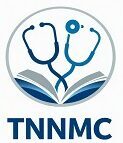
 by
by 